The Transforming West Cumbria (TWC) programme, aimed at improving the lives of West Cumbrians, has already made a positive difference to hundreds of organisations and thousands of people, a new report shows.
Transforming West Cumbria, funded through the Sellafield Ltd social impact, multiplied (SiX) programme and delivered by Cumbria Community Foundation, focusses on addressing the area’s most entrenched social issues and inequalities.
It was created in response to a study commissioned by Sellafield Ltd in 2019, which highlighted persistent social problems including 3,900 children living in poverty, one-in-seven households with an income below £10,000 a year and more children in care than in any other part of the county.
 Sellafield Ltd and Cumbria Community Foundation launched the TWC mid-term report – which details the positive impacts the programme is having – at a showcase event at Energus in Workington last week.
Sellafield Ltd and Cumbria Community Foundation launched the TWC mid-term report – which details the positive impacts the programme is having – at a showcase event at Energus in Workington last week.
From building the resilience and capability of community organisations, inspiring social enterprise, and nurturing young entrepreneurs to improving family wellbeing, addressing financial hardship, and increasing mental health provision, the £6.5 million multi-year programme works collaboratively across multiple sectors and drives a partnership approach to delivery.
Many of the charities and groups supported under the programme attended the event to tell people about their work in West Cumbria including Together We, CADAS, Phoenix Enterprise Centre and the Howgill Family Centre.
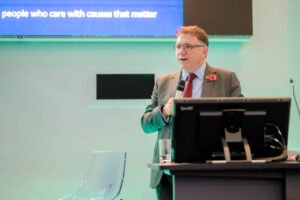
Sellafield Chief Executive Euan Hutton took time to meet with many of them and told the conference: “It has been humbling to hear the stories today and meet some of the groups involved in Transforming West Cumbria.
“You are all amazing. Well done to Cumbria Community Foundation and everyone who makes this happen.”
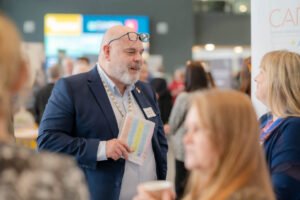 Gary McKeating, Head of Development and Community at Sellafield, opened the event with a passionate introduction to Transforming West Cumbria.
Gary McKeating, Head of Development and Community at Sellafield, opened the event with a passionate introduction to Transforming West Cumbria.
“Trying to address the inequalities that we see in our everyday lives is the thing that puts fire in my belly and drives me on to help develop programmes like Transforming West Cumbria.”
Dr Jenny Benson, Director of Programmes and Partnerships, explained how the huge project had been developed around seven themes to address West Cumbria’s social problems.
“We live in a community that wants to help itself. Community groups want to do great work. Transforming West Cumbria is about harnessing that energy,” she said.
 Keynote speaker, Councillor Emma Williamson, Deputy Leader of Cumberland Council, said the key change was collaboration. “We need to keep investing in these issues and listening to those with a lived experience to find the best way forward.”
Keynote speaker, Councillor Emma Williamson, Deputy Leader of Cumberland Council, said the key change was collaboration. “We need to keep investing in these issues and listening to those with a lived experience to find the best way forward.”
The event demonstrated that more can be achieved by working together and that impact can be multiplied through collaboration. But, there is still so much more that can be done…
Businesses and individuals across West Cumbria, and beyond, are encouraged to get involved in Transforming West Cumbria by volunteering as a trustee, director or committee member for a charity or social enterprise, acting as mentors, sharing skills and training, offering in-kind support and providing match funding.
The full report is available here.
To find out more, contact Jenny Benson or Annalee Holliday on 01900 825760.


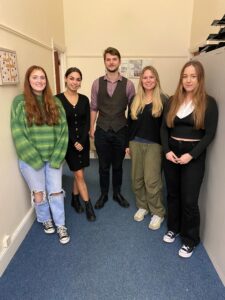

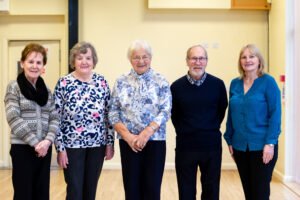
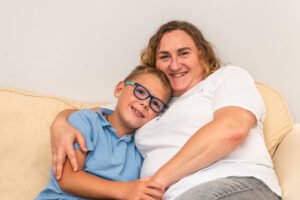
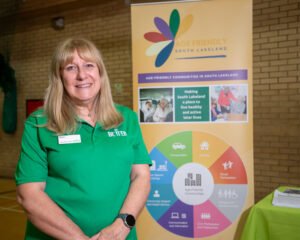
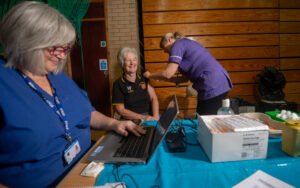
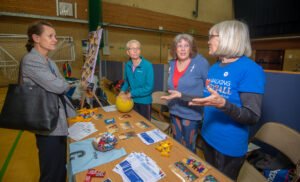
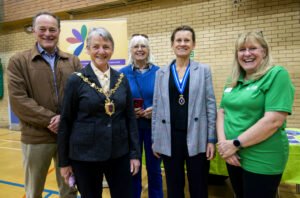
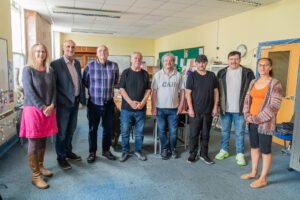 David Henderson, Nuclear Business Manager at Shepley Engineers, visited The Vulture Club with Cumbria Community Foundation’s Director of Programmes & Partnerships, Jenny Benson, to see the impact the company’s grants make on the organisations, and the people they support.
David Henderson, Nuclear Business Manager at Shepley Engineers, visited The Vulture Club with Cumbria Community Foundation’s Director of Programmes & Partnerships, Jenny Benson, to see the impact the company’s grants make on the organisations, and the people they support.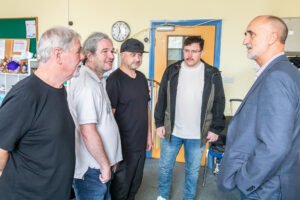 “It really brings it home how much initiatives like this are needed in our communities, and the real difference they make to people’s lives.
“It really brings it home how much initiatives like this are needed in our communities, and the real difference they make to people’s lives. Carlisle Sight Support is a charity supporting the visually impaired across north Cumbria with satellite groups in Brampton, Dalston and Longtown.
Carlisle Sight Support is a charity supporting the visually impaired across north Cumbria with satellite groups in Brampton, Dalston and Longtown. Aiden Thompson, 15, from Whitehaven, collected an extra £1,000 after judges were impressed by his presentation. His business, Cumbria Coastal Crafts, produces framed pebble art and customised laser engraved products.
Aiden Thompson, 15, from Whitehaven, collected an extra £1,000 after judges were impressed by his presentation. His business, Cumbria Coastal Crafts, produces framed pebble art and customised laser engraved products. David Beeby, Chair of Cumbria Community Foundation, added: “We’ve heard different stories from different personalities with different approaches. Every one of them was very impressive. I wish the young entrepreneur all luck in what they’re doing. Business is hard work but you need luck as well.”
David Beeby, Chair of Cumbria Community Foundation, added: “We’ve heard different stories from different personalities with different approaches. Every one of them was very impressive. I wish the young entrepreneur all luck in what they’re doing. Business is hard work but you need luck as well.”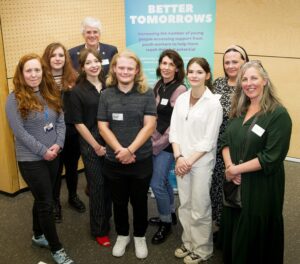 Speaking at a Cumbria Community Foundation event to mark the first anniversary, David said: “I felt that young people had made sacrifices for the older generation in the first year of the Covid pandemic, in terms of their education and opportunities, and we needed to redress that.
Speaking at a Cumbria Community Foundation event to mark the first anniversary, David said: “I felt that young people had made sacrifices for the older generation in the first year of the Covid pandemic, in terms of their education and opportunities, and we needed to redress that.
